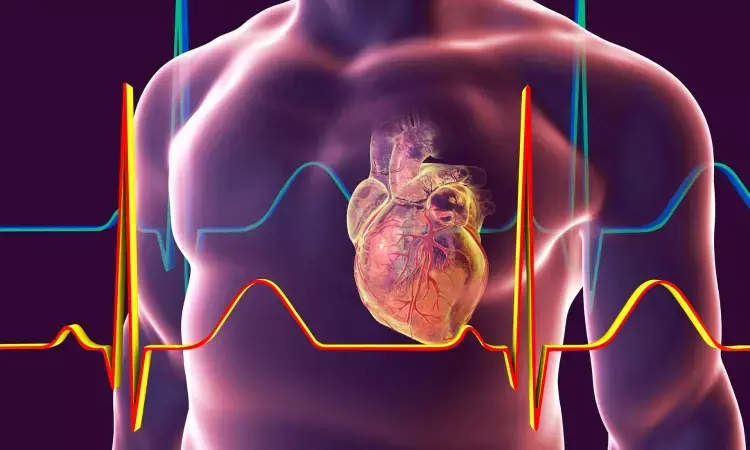- Home
- Medical news & Guidelines
- Anesthesiology
- Cardiology and CTVS
- Critical Care
- Dentistry
- Dermatology
- Diabetes and Endocrinology
- ENT
- Gastroenterology
- Medicine
- Nephrology
- Neurology
- Obstretics-Gynaecology
- Oncology
- Ophthalmology
- Orthopaedics
- Pediatrics-Neonatology
- Psychiatry
- Pulmonology
- Radiology
- Surgery
- Urology
- Laboratory Medicine
- Diet
- Nursing
- Paramedical
- Physiotherapy
- Health news
- Fact Check
- Bone Health Fact Check
- Brain Health Fact Check
- Cancer Related Fact Check
- Child Care Fact Check
- Dental and oral health fact check
- Diabetes and metabolic health fact check
- Diet and Nutrition Fact Check
- Eye and ENT Care Fact Check
- Fitness fact check
- Gut health fact check
- Heart health fact check
- Kidney health fact check
- Medical education fact check
- Men's health fact check
- Respiratory fact check
- Skin and hair care fact check
- Vaccine and Immunization fact check
- Women's health fact check
- AYUSH
- State News
- Andaman and Nicobar Islands
- Andhra Pradesh
- Arunachal Pradesh
- Assam
- Bihar
- Chandigarh
- Chattisgarh
- Dadra and Nagar Haveli
- Daman and Diu
- Delhi
- Goa
- Gujarat
- Haryana
- Himachal Pradesh
- Jammu & Kashmir
- Jharkhand
- Karnataka
- Kerala
- Ladakh
- Lakshadweep
- Madhya Pradesh
- Maharashtra
- Manipur
- Meghalaya
- Mizoram
- Nagaland
- Odisha
- Puducherry
- Punjab
- Rajasthan
- Sikkim
- Tamil Nadu
- Telangana
- Tripura
- Uttar Pradesh
- Uttrakhand
- West Bengal
- Medical Education
- Industry
Routine ECG screening beneficial for early prevention of CVD events, suggests JAMA study

Researchers have found that routine electrocardiogram (ECG) screening could significantly impact the cardiovascular health outcomes of working-age adults. A recent nationwide cohort study investigated the association between ECG abnormalities and cardiovascular disease (CVD) outcomes among individuals aged 35 to 65 years in Japan Health Insurance Association's database. The study was published in JAMA Internal Medicine by Ryuichiro Yagi and colleagues.
The resting ECG is a widely used tool for screening cardiovascular diseases, but its prognostic significance in clinical settings remains underexplored. This study aimed to fill this gap by analyzing data from over 3.6 million participants across seven years, focusing on the relationship between baseline ECG findings and subsequent cardiovascular events.
The study findings were as follows:
• The study included 3,698,429 individuals with a mean age of 47.1 years, where 16.8% had 1 minor ECG abnormality, 3.9% had 2 or more minor abnormalities, and 1.5% had a major abnormality.
Over a median follow-up of 5.5 years, participants with ECG abnormalities showed significantly higher rates of overall death and CVD hospital admissions:
• FDA grants marketing authorization to First Syphilis Screening Test for At-Home UseIncidence rates per 10,000 person-years: 92.7 (normal ECG), 128.5 (1 minor abnormality), 159.7 (≥2 minor abnormalities), and 266.3 (major abnormality).
• Adjusted hazard ratios: 1.19 (1 minor abnormality), 1.37 (≥2 minor abnormalities), and 1.96 (major abnormality).
Additionally, the presence of minor ECG abnormalities was strongly linked to developing new major ECG abnormalities:
• Incidence rates per 10,000 person-years: 85.1 (normal ECG), 217.2 (1 minor abnormality), and 306.4 (≥2 minor abnormalities).
• Adjusted hazard ratios: 2.52 (1 minor abnormality) and 3.61 (≥2 minor abnormalities).
These associations persisted regardless of baseline cardiovascular risk, highlighting the predictive value of ECG in identifying individuals at higher risk of cardiovascular events.
The findings underscore the potential role of routine ECG screening in identifying early signs of cardiovascular risk among working-age adults. In conclusion, this study provides evidence supporting the use of routine ECG screening as a valuable tool for early detection and prevention of cardiovascular events in the working-age population.
Reference:
Dr Riya Dave has completed dentistry from Gujarat University in 2022. She is a dentist and accomplished medical and scientific writer known for her commitment to bridging the gap between clinical expertise and accessible healthcare information. She has been actively involved in writing blogs related to health and wellness.
Dr Kamal Kant Kohli-MBBS, DTCD- a chest specialist with more than 30 years of practice and a flair for writing clinical articles, Dr Kamal Kant Kohli joined Medical Dialogues as a Chief Editor of Medical News. Besides writing articles, as an editor, he proofreads and verifies all the medical content published on Medical Dialogues including those coming from journals, studies,medical conferences,guidelines etc. Email: drkohli@medicaldialogues.in. Contact no. 011-43720751


